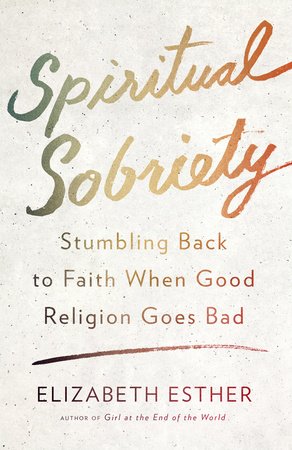There’s a part of me that is reluctant to share anything about this book because the idea of it makes me uncomfortable at the same time it sets me free. Does that even make sense?
 Admitting that religion is an addiction seems sacrilegious. Can you get too much of a good thing?
Admitting that religion is an addiction seems sacrilegious. Can you get too much of a good thing?
The answer is yes and Elizabeth Esther gently guides us through the process of rediscovering a vibrant faith that has been stifled by religion. Spiritual Sobriety: Stumbling Back to Faith When Good Religion Goes Bad is the book I wish I’d read years ago when my whole belief system was falling apart. My “good” behavior didn’t produce the results I wanted from life, and I’ve been wrestling with God ever since.
This book gives us permission to step back from unhealthy systems and practices and relearn healthy spirituality.
While the author is writing from the perspective of someone who grew up in a religious cult, the principles she writes about are applicable in less restrictive religious environments. She explains it this way:
The issue is this: an obsession with spiritual beliefs, rituals, and pursuits that initially helps us but eventually removes our power to make healthy decision and brings significant harm to us and to those close to us. (9)
Elizabeth walks us through a sort of undoing, focusing on reality, moderation and letting go of the need to control others’ behaviors. She also addresses relapse, which is crucial to accept as part of the recovery process with any addiction. That might have been my favorite chapter because it allows for imperfection and acknowledges that transformation is a slow, steady process, not an instant change.
It took me months to read this book but not because the writing was hard to understand. Truthfully, the author got to the heart of so many things I’m dealing with that at times it was overwhelming and I didn’t want to deal with it anymore. It’s a book to take slowly and with great care. I’d advise working through it in partnership with someone else who understands addictive behavior or who is in recovery.
This book isn’t for everyone and it might even make you mad. But if striving for holiness and working harder at religious practices is only making you feel more defeated, this is a recommended read.
I’m going to suggest that we do something really radical, uncomfortable, and borderline blasphemous: we stop trying to be good. (151)
How you react to that sentence is a good indicator of whether or not you should read this book.